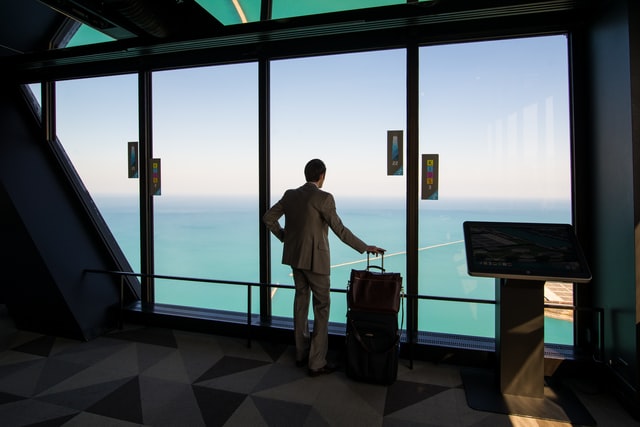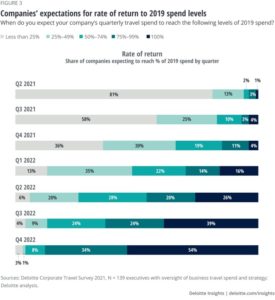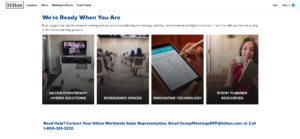Preparing Your Hospitality Marketing Strategy for the Return of Business Travel

For the past two years, as the world has dealt with the impacts of COVID-19, business travel has slowed as conventions were canceled and companies stopped sending their workforce on business trips. In turn, hotels have felt the impact.

According to Deloitte, U.S. company travel budgets declined by 90% or more at the onset of the pandemic in spring 2020 as companies canceled events and restricted travel. Even midway through 2021, data from airlines showed corporate business travel was still 70% or more below pre-pandemic levels. But the uptick is coming.
The latest projections have business travel reaching 65-80% of 2019 levels by the end of 2022 with more stability to come thereafter. Those projections may seem far off now, and the return won’t happen overnight, but hospitality marketers should begin their planning and marketing efforts now before it’s too late.
Showcase your hotel’s business amenities
Business travel is often an opportunity to build brand awareness — make sure your hotel’s marketing materials show that you have what it takes not only to accommodate business travelers but also to provide them with an exceptional experience.
As business travel begins to return, email marketing and targeted advertising campaigns are both effective ways to communicate with businesspeople. It’s important that your messaging to a businessperson is different from your typical guest. One of the most important things hoteliers can do is make sure their business amenities are well-marketed. Business amenities are a way for your hotel to highlight its quality as an all-inclusive business solution.
Business travelers are often looking for a range of features:
- Free and fast Wi-Fi — A survey of employees at 660 businesses found that Wi-Fi (84%) was the most important booking factor for travelers, ahead of room rate, location, and breakfast.
- Business center — Business travelers are known to work more when they’re traveling than at the office and many want to get out of their room. It’s good to promote your business center features, including comfortable seating, printer, and fax capabilities, and more.
- Readily available food options — Business travelers are often on the run in the morning. Does your hotel offer breakfast? What are the coffee amenities in your rooms and lobby? Do you have grab-and-go options? What room service is available at night?
- Transportation and shuttle options — While ridesharing options like Uber and Lyft are now top transportation options, if your hotel has an airport shuttle or other transportation options, it’s good to note them.
- Fitness center — With as much time as they spend on airplanes, in cars, and at conference tables, it’s easy for business travelers to get out of their routine. Many turn to a hotel’s fitness center to keep up.
- Flexible check-in and check-out — Does your hotel have contactless check-in or check-out? If so, it’s an amenity worth communicating. Similarly, many business travelers arrive at uncommon hours. Does your hotel allow flexible options to check-in early or leave late?
When it comes to marketing your hotel’s business amenities and gearing your message toward a business traveler, it’s important to start with your hotel’s audience. Even if your hotel’s prototypical guest is a businessperson, don’t ignore their personal side. The rise of ‘bleisure’ has only made this angle more important.
According to a study from Expedia, 60% of business trips were extended for leisure purposes. More and more, business people are adding days to both the front and back end of their stays to combine leisure with their work trip. Business travelers need downtime just like vacationers, so it’s important to market business-friendly entertainment options available throughout their stay.
Communicate your hotel’s health guidelines
Given the current climate, businesses want to ensure their people are safe and healthy while also protecting their bottom line. These two goals equate to two important marketing factors: First, now more than ever it’s important to market the guidelines your hotel has in place as it pertains to cleanliness and COVID-19 guidelines. Second, if your hotel offers flexible booking or cancellation policies, they carry increased importance.
According to a study from the American Hotel & Lodging Association, 62% of consumers placed overall cleanliness in their top-three factors when choosing a hotel, up from 38% prior to the pandemic. As infection rates ebb and flow, hospitality marketers should keep this messaging top of mind, including on their hotel website, social media channels, and email marketing efforts. Hilton provides a great example with its CleanStay marketing, which highlights features including:
- Face covering guidelines
- Housekeeping
- Public area cleaning
- Dining options and guidelines
- Contactless payment and check-in/out options
Many hotels have adjusted their cancellation guidelines since early 2020. If your hotel offers 24-hour cancellation, for example, it can be a worthwhile marketing message.
Market your hotel’s convention and meeting spaces
As concerts and sporting events begin ramping back up, companies across the country are expected to begin rescheduling conventions and company events. Even if that uptick takes more time, hospitality marketers should be thinking ahead.
Like it did with communicating its health plans, Hilton engaged with its business audience through EventReady, which highlights not only health actions the company is taking but also hybrid solutions that allow for in-person and virtual meetings, spaced out convention areas, technology and more.
If your hotel offers convention or meeting options, it’s important to begin crafting that messaging and using advertising and organic channels to promote it.
Get your website up-to-date
If you weren’t already considering it, the return of business travel is yet another reason to take a closer examination of your website. Is the design current? Does the content still speak to your target audience? Is it technically sound? Whether your hotel is hoping for better organic search performance through Search Engine Optimization or an increased conversation rate, these are all questions you should answer internally.
When it comes to business travelers specifically, data from Trondent shows that 79% of corporate travelers used their mobile phones to complete bookings. Combine that with the fact that Google found that only 46% of people consider researching hotels on their mobile device easy, leading many travelers to go to another site.
Start your website assessment by seeing if your hotel’s website is optimized for search engines and how it performs from a technical SEO perspective. Then, consider what user experience enhancements can be made to drive more direct bookings.
Create a follow-up marketing plan
We’ve all seen travelers in the hotel lobby scanning their social media news feeds or reading their email on their cell phone while they wait for their taxi to pull up or partner to come down the elevator. Building marketing initiatives around the customer journey process is important, but you shouldn’t forget about other tactics.
Social media and email marketing can both be effective marketing tactics before, during, and after a stay. Business travel is a leading reason people are on social media, and business travelers spend up to 22 hours per week using business and productivity apps, as well as checking their email accounts. According to Mashable, the average business traveler checks their phone roughly 34 times per day.
By utilizing social media and email marketing, hospitality marketers have the opportunity to target their hotel’s message and craft it to businesspeople. Business travel is highly driven by loyalty, and the stronger relationship a hotel can build with a business traveler, the better chance that person will choose that same hotel the next time they’re in town.
As business travel picks back up into 2022 and beyond, it will be important for hotels to market their business services and amenities to those who are traveling again. Not sure where to begin with your plan? Our 2022 Hospitality Marketing Budget eBook (Branded or Independent) provides a breakdown of how much you should plan to spend in different areas so your hotel is ready when business travel begins picking back up.


